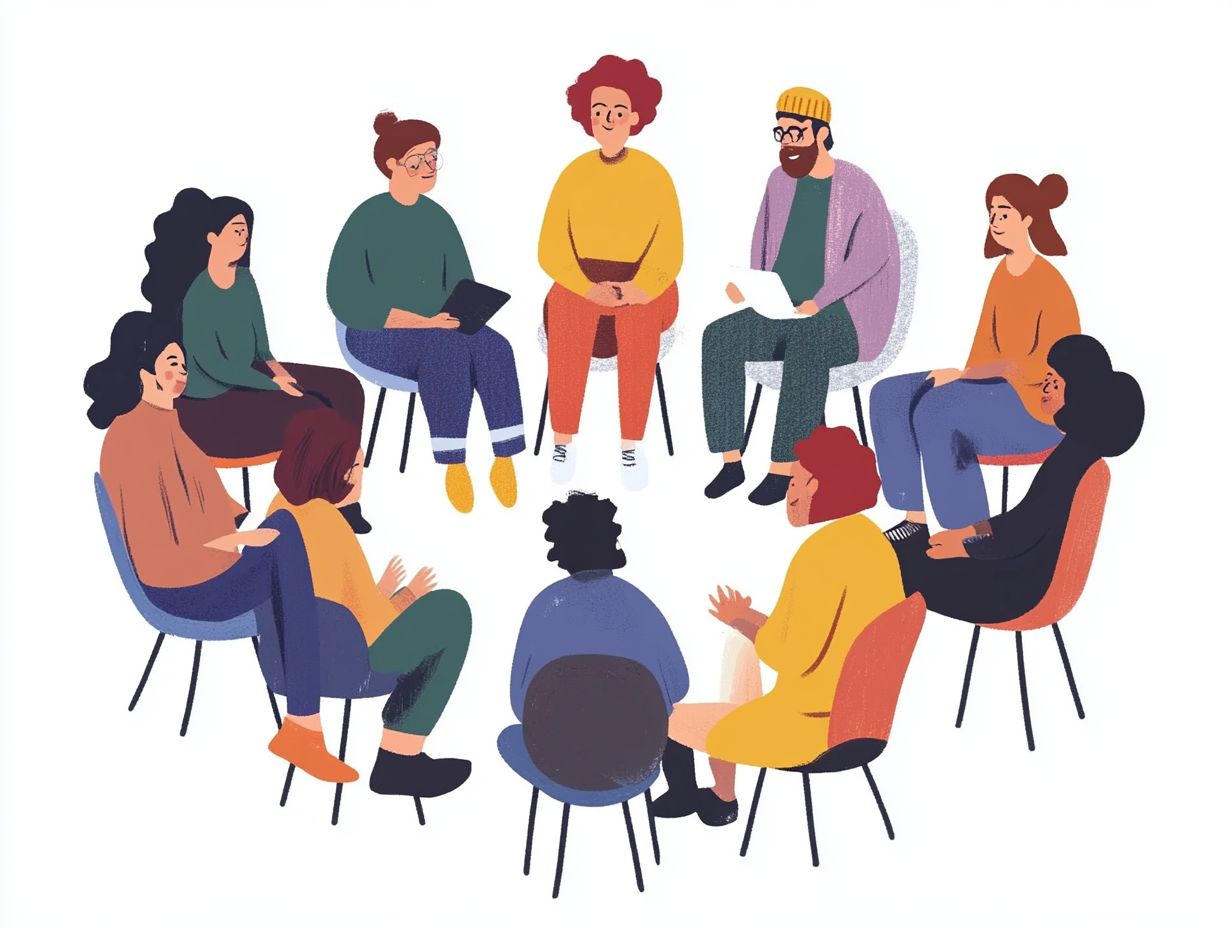Emotional Awareness: A Path to Stronger Bonds
Emotional awareness is your ability to recognize and understand not only your own emotions but also those of others. This vital skill enhances your interpersonal relationships, social skills, and fosters personal development, equipping you with resilience in the face of challenges.
The importance of emotional awareness can profoundly impact your connections with others. You can discover practical strategies to cultivate this essential skill, reaping benefits such as improved communication, deeper understanding, and greater empathy. It also has a significant emotional impact on your personal and professional relationships.
Whether you’re navigating conflicts, managing stress, or coping with grief, emotional awareness can serve as your guiding light. By strengthening your emotional intelligence and interpersonal skills, you enrich your relationships and create a more fulfilling life.
Discover how you can transform your relationships!
Contents
- Key Takeaways:
- What Is Emotional Awareness?
- Why Is Emotional Awareness Important?
- How Does Emotional Awareness Affect Relationships?
- How Can You Develop Emotional Awareness?
- 1. Practice Mindfulness
- 5. Seek Therapy, Counseling, or BetterHelp
- What Are the Benefits of Emotional Awareness?
- 4. Increased Empathy and Compassion
- How Can Emotional Awareness Help in Difficult Situations?
- 2. Coping with Stress and Anxiety
- 3. Managing Grief and Loss
- Frequently Asked Questions
- How can we improve our emotional awareness?
- What are some signs of low emotional awareness?
- Can emotional awareness help in conflict resolution?
- How does emotional awareness impact our relationships?
- Is emotional awareness something that can be learned or is it innate?
Key Takeaways:
- Emotions play a crucial role in our lives. Being aware of them leads to stronger relationships and better stress management.
- Developing emotional awareness involves practices like mindfulness and effective communication.
- Emotional awareness helps you cope with stress, manage conflict, and enhance empathy.

What Is Emotional Awareness?
Emotional awareness is your ability to recognize and understand not only your own emotions but also those of others. This skill is essential for emotional intelligence and contributes to an individual’s high emotional quotient.
Cultivating self-awareness is essential for your personal development. It significantly impacts the relationships you build, the dynamics you foster in the workplace, and your leadership effectiveness.
By enhancing your emotional awareness, you can elevate your emotional health, manage stress with finesse, and tailor your responses to various emotional challenges that arise in your daily life. This leads to performance improvement and workplace success.
Furthermore, grasping your emotional triggers the stimuli that provoke emotional responses is key to developing resilience. This understanding gives you the power to maintain a positive outlook and support your psychological well-being. It also aids in conflict resolution and team collaboration.
Why Is Emotional Awareness Important?
Emotional awareness is fundamental, serving as the backbone of emotional intelligence, which plays a crucial role in navigating workplace dynamics and fostering effective leadership. By honing your emotional awareness, you can cultivate stronger emotional connections, refine your communication strategies, and lead with genuine empathy. All of which contribute to a healthier organizational culture.
Being emotionally aware significantly enhances your psychological well-being. It empowers you to manage stress and emotional challenges more effectively, facilitating both personal and professional growth. This contributes to building a vibrant workplace culture and effective leadership.
Start developing your emotional awareness today and unlock the benefits for your personal and professional life!
How Does Emotional Awareness Affect Relationships?
Emotional awareness plays a pivotal role in shaping your relationships by enhancing your interpersonal skills, fostering empathy, and helping you communicate better by really listening. When you are attuned to your own emotions and those of others, you can forge stronger connections, navigate conflicts with greater ease, and cultivate a deeper emotional understanding of your interactions. This is crucial for both personal relationships and effective leadership.
This heightened awareness not only aids in resolving conflicts but also fortifies emotional bonds, leading to more meaningful and supportive relationships in both your personal and professional life. It also contributes to better decision-making processes and adaptive responses in various situations.
With an increased capacity for emotional insight, you can recognize non-verbal cues that often express feelings more powerfully than words ever could. By practicing active listening, you can respond more thoughtfully to emotional triggers, reducing the misunderstandings that typically arise in various relationship dynamics.
As your emotional awareness deepens, empathy flourishes, creating a solid foundation for trust and collaboration. This is especially vital in professional settings, where diverse perspectives can spark innovative solutions but can also create barriers if emotions aren t properly understood. Leveraging emotional intelligence in such scenarios can lead to better team collaboration and workplace dynamics.
Ultimately, nurturing these interpersonal skills leads to healthier interactions, giving you the power to express your feelings openly while remaining receptive to the emotions of others. This also helps in conflict adaptation and overcoming communication barriers.
How Can You Develop Emotional Awareness?
Developing emotional awareness is a multifaceted journey that requires you to practice mindfulness, enhance your self-regulation, and reflect on your personal emotional triggers. It also involves improving your social awareness and emotional competencies.
Engaging in mindfulness practices enables you to cultivate a deeper understanding of your emotions and reactions. Reflective exercises help you identify patterns that influence your emotional well-being and emotional literacy.
Employing effective communication strategies can greatly improve your emotional expression, enhancing your emotional intelligence and paving the way for more fulfilling relationships and greater success in the workplace. This is key to breaking down communication barriers and truly connecting with others!
1. Practice Mindfulness
Practicing mindfulness can significantly enhance your emotional awareness by encouraging you to focus on the present moment and observe your thoughts and feelings without judgment. This approach not only helps you manage stress but also fosters a deeper understanding of your emotional experiences, ultimately promoting your emotional health and social awareness.
By regularly engaging in mindfulness practices, you can cultivate emotional resilience, leading to improved psychological well-being and healthier responses to emotional challenges. This, in turn, aids in stress management and mental health.
Mindfulness techniques like meditation, yoga, and breathing exercises are powerful allies on this journey. Meditation invites you to explore the depths of your consciousness, uncovering layers of emotion while nurturing a profound sense of peace. Meanwhile, yoga harmonizes physical movement with mindfulness, allowing you to release pent-up tension and embrace relaxation.
Breathing exercises, in particular, deliver immediate stress relief by grounding you and guiding your breath into a slow, steady rhythm. These practices are supported by experts such as Tasha Eurich and Jamil Zaki, who emphasize their importance in their works “Insight” and “The War for Kindness,” respectively.
Together, these practices empower you to recognize emotional triggers and respond more constructively, enhancing your mental clarity and fortifying your emotional health. This also contributes to improved workplace dynamics and leadership effectiveness.
2. Identify Your Emotions

Identifying your emotions is a pivotal step in cultivating emotional awareness. It paves the way for a deeper understanding of your emotional triggers and enhances your emotional literacy. Through self-reflection and journaling, you can uncover valuable insights into your emotional responses and their effects on your interactions and decision-making processes.
This practice sharpens your emotional intelligence, making you feel more empowered in every situation. It also fortifies your emotional resilience, enabling you to recognize and adapt your responses to various emotional situations. Emotional literacy is a key aspect of self-awareness and emotional development.
Incorporating a rich emotional vocabulary into your daily conversations can illuminate your feelings, providing clarity and enhancing communication with those around you. It s essential to pinpoint your emotional triggers, as they reveal underlying patterns in your behavior and reactions. This gives you the power to manage stressful encounters more effectively and aids in conflict resolution and relationship management.
Engaging in mindfulness practices and deliberate reflection nurtures a deeper connection to your emotions. This allows for a more profound understanding of your inner landscape. By acknowledging and addressing these triggers, you can navigate your emotional journey with increased confidence, ultimately elevating your overall emotional well-being.
3. Reflect on Your Triggers
Reflecting on your emotional triggers is essential for enhancing your emotional awareness. It allows you to understand the emotions you experience in response to specific situations. This kind of reflection fosters better self-regulation, enabling you to manage your emotional responses more effectively.
Recognizing these triggers helps you navigate your emotional experiences with greater insight, elevating your emotional intelligence and enriching your relationships with others. It also assists you in overcoming emotional challenges and fostering emotional support systems.
Identifying your emotional triggers requires a thoughtful examination of your past experiences, your reactions in various situations, and the context surrounding those feelings. Take time to reflect on these moments; they are crucial for your growth and for building emotional resilience.
Utilizing strategies such as journaling your feelings, engaging in mindfulness practices, or having supportive conversations can significantly aid in this journey. These reflective practices empower you to analyze your responses and make conscious choices, paving the way for more balanced and controlled emotional reactions in the future.
4. Communicate Effectively
Effective communication is essential for developing emotional awareness. It encompasses not just the expression of your own emotions but also the active listening to others.
By employing feedback mechanisms (ways to give and receive helpful comments) and engaging in active listening, you foster a deeper understanding of emotional cues. This, in turn, enhances your emotional intelligence, which is crucial for performance improvement and relationship management.
When you refine your communication strategies, you create an environment that encourages emotional expression and connection. This ultimately paves the way for stronger relationships and aids in overcoming communication barriers, fostering a positive organizational culture.
Incorporating techniques such as paraphrasing and reflective listening can greatly enrich this process. These techniques make the other person feel truly heard and validated. Recognizing and responding to non-verbal signals, like facial expressions and body language, further enhances your conversations. These skills are essential for constructive feedback and emotional understanding.
It’s equally important to provide constructive feedback in a manner that nurtures growth rather than provoking defensiveness. Keep the focus on understanding rather than assigning blame. This method boosts your performance and fosters leadership effectiveness.
By mastering these techniques, you can navigate emotional landscapes more effectively and build relationships, fostering resilience and empathy within your interpersonal dynamics. By improving your social skills and self-regulation, you can achieve personal development.
5. Seek Therapy, Counseling, or BetterHelp
Seeking therapy or counseling is a crucial step in developing your emotional awareness. Don t hesitate professionals are ready to help you on your journey to emotional health!
Through therapeutic conversations, you can delve into your emotional experiences and emotional literacy. You can identify your triggers and gain insights that enable you to manage your emotions with greater effectiveness.
This support not only enhances your emotional awareness but also fosters psychological well-being and resilience when facing emotional challenges. Mindfulness practices can also support stress management and overall emotional health.
In engaging with such emotionally supportive environments, you often uncover constructive coping mechanisms that empower you to navigate life s complexities with more ease. The process encourages self-reflection and nurtures a deeper understanding of your personal values, ultimately leading to healthier relationships with yourself and others.
By articulating your feelings in a safe space, you can work through past traumas and recognize patterns that may be hindering your emotional growth and self-awareness.
As you become more attuned to your emotional landscape and emotional connections, you lay a foundation for lasting change. This equips you with skills to effectively manage stress and anxiety and improve your adaptive responses, enriching your overall quality of life.
What Are the Benefits of Emotional Awareness?
The benefits of emotional awareness are extensive, significantly elevating your emotional intelligence and enhancing your ability to manage relationships, both personally and professionally.
By cultivating this awareness, you pave the way for workplace success through improved communication and collaboration. You nurture a positive outlook and emotional resilience when faced with challenges.
This skill not only refines your decision-making processes but also bolsters your overall emotional health, transforming it into a vital asset in both your personal life and within organizational settings.
1. Improved Communication
Imagine a workplace where everyone feels understood emotional awareness can make this a reality. Improved communication stands out as one of the primary benefits of emotional awareness, giving you the power to articulate your emotions clearly while also grasping the emotions of others with greater efficacy. This enhancement in your interpersonal skills creates a supportive environment conducive to feedback and encourages constructive dialogue both of which are vital for effective leadership.
By cultivating emotional awareness, you can deftly navigate communication barriers, paving the way for more productive interactions in both personal and professional spheres.
Emotional awareness allows you to tailor your communication style to resonate with your audience, whether in a team meeting or during a one-on-one conversation. This adaptability significantly boosts trust and rapport, cultivating an atmosphere where team members feel valued and understood.
Strategies such as active listening, demonstrating empathy, and providing emotional validation validating someone s feelings means showing that you understand and support their emotions play a pivotal role in this process.
As a result, you not only strengthen relationships but also enhance overall team dynamics, encouraging collaboration and fostering innovation. Ultimately, by practicing emotional awareness and enhancing your emotional quotient, you position yourself to drive effective leadership and inspire others toward achieving collective goals.
2. Better Understanding of Self and Others

Gaining a deeper understanding of yourself and others is a remarkable benefit of enhancing your emotional awareness. As you explore your emotional experiences and those of the people around you, you cultivate emotional intelligence, which paves the way for greater self-awareness and the ability to empathize with diverse perspectives. By developing this understanding, you can adeptly navigate complex emotional landscapes, fostering more harmonious interactions and relationships in both your personal and professional life.
Emotional awareness gives you the power to recognize and articulate your feelings, a vital step toward forging a deeper connection with yourself and developing a heightened sensitivity to the emotional states of those nearby. This increased sensitivity boosts your empathy and builds a strong foundation for effective communication and conflict resolution.
As you grow in your understanding of your emotional triggers and responses, your interactions with others evolve; you can respond with compassion and understanding, enriching your social exchanges. Ultimately, the benefits of improving your emotional awareness stretch far beyond personal growth, positively influencing workplace dynamics, collaboration, and the broader fabric of community relationships.
3. Stronger Relationships
Stronger relationships are a direct benefit of emotional awareness, allowing you to connect on a deeper emotional level while fostering empathy and understanding. By being attuned to your own emotions and those of others, you can forge more meaningful connections, navigate conflicts with finesse, and ensure conflict adaptation. This enhanced emotional intelligence ultimately nurtures healthier and more resilient relationships, whether in your personal life or the workplace.
Emotional awareness serves as the cornerstone for robust relational frameworks, enabling you to interpret emotional cues and respond with genuine compassion. When you practice active listening, you can better empathize with the experiences of others, even in diverse environments where social awareness is key, creating a shared sense of understanding. This dynamic not only reduces misunderstandings but also strengthens bonds by instilling trust and respect.
Being aware of your own emotional triggers allows you to manage your responses more effectively, leading to constructive dialogues instead of reactive confrontations. As a result, emotional intelligence fosters an environment where cooperation thrives, enhancing your ability to work harmoniously across various settings.
4. Increased Empathy and Compassion
Increased empathy and compassion are among the many benefits of emotional awareness. As you become more attuned to the emotional experiences of others, you foster deeper emotional connections that enhance your overall psychological well-being. This sensitivity empowers you to respond with understanding and kindness in all your interactions.
As your emotional intelligence (the ability to understand and manage emotions) grows, so too does your capacity for empathy. This allows you to approach others with compassion in both personal and professional spheres.
By recognizing and validating the feelings of those around you, you create safer spaces for open dialogue and mutual understanding. Through this perspective, emotional awareness not only enriches your relationships but also nurtures a culture of support and acceptance. This is especially crucial in diverse environments, where varying backgrounds and experiences can influence individual emotional responses.
Ultimately, cultivating emotional awareness serves as a bridge that connects hearts and minds, facilitating deeper, more meaningful interactions in every aspect of life.
How Can Emotional Awareness Help in Difficult Situations?
You need emotional awareness to navigate challenging situations effectively, providing you with the tools to handle conflict resolution and manage stress effectively. By recognizing and understanding both your own emotions and those of others, you can deal with emotional challenges with increased resilience and adaptability.
This level of emotional intelligence not only helps you manage conflicts but also cultivates a supportive environment where emotional experiences are addressed constructively.
1. Dealing with Conflict
Effectively managing conflict relies significantly on your emotional awareness. This skill enables you to recognize and comprehend the emotions at play in these challenging situations. Understanding these emotions and their emotional impact is crucial for resolving disputes, allowing you to navigate conflicts with empathy and constructive communication. By harnessing your emotional intelligence and social skills, you can engage in problem-solving discussions that foster a collaborative atmosphere, helping to mitigate conflict while enhancing your interpersonal skills.
To further elevate your emotional awareness and develop emotional competencies, it s vital to cultivate active listening skills and maintain an openness to different perspectives. Practicing mindfulness can keep you grounded, ensuring that you respond thoughtfully instead of reacting impulsively during heated moments. Encouraging a culture of feedback promotes healthier interactions, where everyone feels valued and understood. By establishing common goals, you can redirect attention towards mutual interests, paving the way for more effective solutions.
Through these strategies, the importance of emotional sensitivity and emotional understanding becomes clear, equipping you with a more resilient approach to navigating disagreements.
How will you apply emotional awareness in your next challenging situation?
2. Coping with Stress and Anxiety
Stress and anxiety can feel overwhelming, but here s how emotional awareness can transform your experience. Coping becomes significantly easier when you embrace emotional and self-awareness. This powerful tool helps you identify your emotional responses and triggers. Gaining insight into these emotions allows you to implement effective anxiety management strategies and build emotional resilience.
Understanding your emotional impact on others enhances your personal development. Mindfulness practices are particularly beneficial, helping you cultivate emotional awareness and equipping you with the necessary tools to navigate stress. This ultimately leads to a more balanced emotional state and better stress management.
This heightened awareness enables you to recognize patterns contributing to your anxiety. Act now to reduce those feelings by utilizing techniques like deep breathing, progressive muscle relaxation, and journaling. These methods deepen your understanding and support your journey. Additionally, developing social skills and emotional regulation benefits anxiety management and fosters emotional health.
Engaging in regular mindfulness meditation sharpens your emotional perception and fosters a sense of calm. This gives you the power to respond to stressors with greater composure and adaptive responses, significantly enhancing your emotional understanding and psychological well-being.
Incorporating emotional regulation strategies, such as reframing negative thoughts and practicing self-compassion, is invaluable in your quest for improved emotional health. Weaving these strategies into your daily routine nurtures a healthier relationship with your emotions, leading to reduced stress and enhanced well-being. Moreover, improving your interpersonal skills and conflict resolution abilities contributes to your emotional resilience and professional growth.
3. Managing Grief and Loss

Managing grief and loss can be an incredibly emotional journey. However, cultivating emotional awareness makes navigation significantly easier. Recognizing and understanding the myriad emotions tied to grief allows you to effectively process your feelings and reach out for emotional support when necessary.
This heightened understanding of emotions enhances your psychological well-being and empowers you to adopt healthy coping mechanisms. Engaging in community support and practicing empathy further aid in this process.
Emotional awareness is pivotal for healthy grieving. It allows you to pinpoint specific feelings like sadness, anger, or guilt, creating a clearer pathway to healing. Techniques such as journaling, practicing mindfulness, and engaging in open conversations with trusted friends or support groups deepen your understanding of these emotions.
Additionally, seeking professional help, like counseling, equips you to navigate your grief more effectively. Leveraging emotional competencies and understanding emotional cues can significantly improve your coping strategies.
By acknowledging your emotional state, you foster a supportive environment for yourself and those around you. This transforms grief into an opportunity for emotional growth and meaningful connection elements essential for your healing journey. Engaging in active listening and building relationships through empathy can facilitate emotional connections and support during this time.
Frequently Asked Questions
What is emotional awareness and why is it important for building stronger bonds?
Emotional awareness is the ability to recognize and understand our own emotions and the emotions of others. It is crucial for building stronger bonds because it allows us to communicate effectively, empathize with others, and form deeper connections. This is vital for effective leadership and navigating workplace dynamics, as well as for enhancing personal relationships.
Why is emotional awareness a game changer in relationships?
Emotional awareness transforms relationships by fostering open communication and deeper connections, leading to healthier interactions and mutual understanding.
How can we improve our emotional awareness?
We can improve our emotional awareness by practicing mindfulness, reflecting on our emotions, and communicating openly and honestly with others.
Therapy or counseling can also be helpful.
Reading works by experts can provide valuable insights into emotional intelligence and self-regulation.
What are some signs of low emotional awareness?
Signs of low emotional awareness include difficulty expressing emotions, feeling overwhelmed by emotions, and struggling to understand or empathize with others’ emotions.
People with low emotional awareness may also have difficulty managing their emotions in a healthy way. This can create communication barriers and hinder performance improvement in both personal and professional settings.
Can emotional awareness help in conflict resolution?
Yes, emotional awareness is key to resolving conflicts successfully. It allows us to better understand and communicate our own emotions and the emotions of others.
This can lead to more productive and empathetic conversations, reducing the likelihood of conflicts escalating. Using communication strategies and ways to give feedback can also facilitate conflict adaptation and resolution.
How does emotional awareness impact our relationships?
Emotional awareness greatly enhances our relationships. It promotes open communication and fosters empathy, helping us navigate conflicts more effectively.
It also allows us to form deeper connections and build stronger bonds with others. This is essential for team collaboration and maintaining a positive workplace culture.
Is emotional awareness something that can be learned or is it innate?
While some people may have a natural tendency towards emotional awareness, it is a skill that can be learned and developed over time.
With practice and self-reflection, anyone can improve their emotional awareness and strengthen their relationships. Engaging in personal development activities and seeking constructive feedback is crucial for your emotional development.






